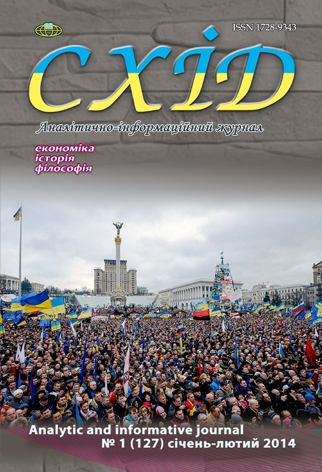The formation of stuff educational and development system of thermal networks
DOI:
https://doi.org/10.21847/1728-9343.2014.1(127).23058Keywords:
staff development, training, vocational training, heating networks, re-engineeringAbstract
The article is devoted to the research of the goals and targets of creation system which deals with vocational training and staff development of domestic heating networks. The author provides the analysis of heating networks modern state and it's allowed to identify the major trends of their development. Based on this information the author defines necessity to introduce energy-efficient technologies and equipment for heating networks and this fact leads us to the need to form new system of upgrading and improving staff professional skills.
The article proposes major stages of staff education based on four genes of the eleventh chromosome taken from Gouillart and Kelly's approach to re-engineering. The author chooses as main directions of education such areas as manufacture and equipment modernization, improving efficiency of energy saving and newest developments in communal services.
It is shown in detail the designed plan to qualify the personnel of heating networks. It should be noted the importance of engaging leading experts of utility companies, professors of educational institutions and scientific organizations for elaborating educational programs for potentially perspective employees. At the end of educational process the employees will get certificates of advanced training on studying programs and they will be promoted when it will be need.
In conclusion the article sums up that formation of this stuff educational and development system of heating networks will ensure high work efficiency and let to raise the quality of provided services.Downloads
References
Гуияр Франсис Ж. Преобразование организации / Ж. Гуияр Франсис, Н. Келли Джеймс ; [пер. с англ.]. - М. : Дело, 2000. - 376 с.
Ганущак-Єфіменко Л. М. Система ефективного управління розвитком інноваційного потенціалу в умовах прогнозованих ризиків / Л. М. Ганущак-Єфіменко // Формування ринкових відносин в Україні. - 2011. - № 9 (124). - С. 66-70.
Семенов А. Г. Аналіз формування та використання кадрового потенціалу / А. Г. Семенов, А. І. Шарко // Вісник економічної науки України. - 2010. - № 1. - С. 93-97.
Захарова О. Розвиток теорії інвестування в людський капітал / О. Захарова // Україна: аспекти праці. - 2012. - № 3. - С. 45-51.
Єфремов О. С. Теоретичні засади управління інноваційним розвитком підприємства / О. С. Єфремов // Економіка. Менеджмент. Підприємництво. - 2012. - № 24 (І). - С. 82-88.
Качала Т. Реформування житлово-комунального господарства в контексті регіонального розвитку / Т. Качала // Економіка України. - 2010. - № 9. - С. 84-93.
Круть О. Водовугільне паливо: стан проблеми і перспективи використання / О. Круть, В. Білецький // Вісник НАН України. - 2013. - № 8. - C. 58-59, 63-64.
REFERENCES
Gouillart F. J., Kelly J. N. (2000), Transforming the Organization, Delo, Moskow, 376 p. (rus).
Hanushchak-Yefimenko L. M. (2011), Effective management development of innovative potential in terms of predictable risks, Formation of Market Relations in Ukraine, 9 (124), pp. 66-70 (ukr).
Semenov A. H. (2010), Analysis of formation and use of human resources, Economic Science Journal, 1, pp. 93-97 (ukr).
Zakharova O. (2012), Development of the theory of investment in human capital, Ukraine: aspects of labor, 3, pp. 45-51 (ukr).
Yefremov O. (2012), Theoretical principles of management innovative development of enterprise, Economy, Management, Enterprise, 24 (І), pp. 82-88 (ukr).
Kachala T. (2010), Reforming housing and communal services in the context of regional development, Economy of Ukraine, 9, pp. 84-93 (ukr).
Krut O., Biletskyi V. (2013), Water-coal fuel: state of problem and prospects of using, Bulletin of the National Academy of Sciences of Ukraine, № 8, pp. 58-59, 63-64 (ukr).
Downloads
Published
How to Cite
Issue
Section
License
Copyright (c) 2014 Vasil Vorotintsev

This work is licensed under a Creative Commons Attribution-NonCommercial-NoDerivatives 4.0 International License.
1. Authors bear responsibility for the accuracy of facts, quotations, numbers and names used.
2. Manuscripts are not sent back.
3. The publisher does not always agree with the authors' opinion.
4. The authors reserve the right to authorship of the work and pass the first publication right of this work to the journal under the terms of a Creative Commons Attribution-NonCommercial-NoDerivatives 4.0 International License. This license allows others to distribute (copy) the published work for non-commercial purposes, provided there is mandatory attribution to its authors and a link to the first publication in our journal.
5. The authors have the right to conclude separate supplement agreements that relate to non-exclusive work distribution in the form in which it has been published by the journal (for example, to upload the work to the online storage of the journal or publish it as part of a monograph), provided that the reference to the first publication of the work in this journal is included.

